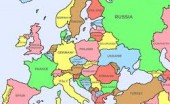Re Ian Bremmer 'Could third-party candidates upend the 2024 US election?' 3 April The current political movement in the USA…
Wednesday Night #1606
Written by Diana Thebaud Nicholson // December 12, 2012 // Herb Bercovitz, Wednesday Nights // 1 Comment
The Fiscal Cliff
Aphorisms that slip easily off the tongue can, at times, conjure up an image pleasing to the imagination, but with little inherent truth or value. The term, fiscal cliff conjures up an even greater concern than the more realistic fear of a shift in tectonic plates causing a disaster in California.
Politics is a game in which the real winner has been able to convince the voting public that he, she or they have saved the country from disaster, be it physical, monetary or other. In the unlikely event that the problem were not resolved, either by raising taxes, or reducing expenditures All North America and Europe would suffer as well. Politically, any solution would result in some pain to the American electorate, so it would be preferable to apply the solution as early as possible, providing two years for the bruises to heal prior to the next federal election, whether it involves raising taxes, reducing expenses or a more creative mix of measures. Certainly, a simple solution would be a consumption tax, which most countries use for funding social programs, along with discontinuation of such measures as mortgage deductibility which, in effect, subsidizes debt. The proposal of a consumption (or value added) tax was being favored in the Nixon era, but ultimately fizzled out. When the economy is doing well, no one wants to see their taxes rise.
Current low interest rates and a belief that the fiscal cliff is a non-starter make the stock market a continuing favourite for achieving a return above the rate of inflation.
Emerging markets (especially Singapore) are doing very well, but some Wednesday Nighters caution that this will not be the case in the longer term. Despite an unsatisfactory legal system, Russia has been doing very well thanks to its strength in gas and oil. China’s consumption of commodities, which exceeds even that of the United States, has been responsible for the success of commodity markets in South America, a situation predicted to become less beneficial to South America in the future. Higher investment yields in developing countries have resulted in a significant capital flow from developed to emerging countries.
Unlike other emerging markets China has attained a high level of educational achievement. In contrast, The Middle East is said to have highest population growth and relatively poor educational achievement.
Hungarian president, Viktor Orban, is described by the Hungarian diaspora .as a “little man with a big ego.” who has evolved from reformer to dictator. He is said to have received a scathing letter from the German government and it is believed that Hungary today would not have been considered for membership in the European Union had the current government been in power at the time.
.
Justin Trudeau has made great strides in his political career and has demonstrated his ability to achieve palpable gains for the Liberal Party. If, indeed it is he who will return the party to this place of prominence that it held in the recent past, he will have to overcome the obvious popularity of the N.D.P., the official opposition in Parliament.
Prologue
It has been called to our attention that this Wednesday falls on the last repetitive date that we will witness – 12/12/12; one wag suggests that if the Mayan Prophecy (as interpreted by some) does indeed forecast a form of Armageddon on December 21 (or 23 according to others), this is certainly true. On the other hand, it appears that Mayanist scholars as opposed to proponents of Mayanism, don’t think the world will come to an end – which means that Wednesday the 19th will not be the last one ever.)
This Wednesday we have a pre-Christmas or Armageddon (take your choice) gift to you – an evening with Peter Berezin and not one, but two reports from BCA, – those of November and December.
The November report contains the cleverly titled “You Got To know When To hold eM, know When To Fold eM: The Outlook For emerging Markets”, while the December report focuses on the ongoing debate between Austrian and Keynesian economists and argues that while the advice of Austrian economists on how to reduce unemployment during a recession is likely to do more harm than good, the Austrian view of how monetary imbalances can lead to downturns has much. [Udo Stundner reminds us that funnily enough, none of the original thoughts put forward by Schumpeter, Hayek etc. has ever been practiced in Austria itself.]
The resignation of Italian premier Mario Monti and the possible renascimento (with none of the positive connotations of the original one) of the dreaded Silvio Berlusconi give rise to numerous nervous headlines, ranging from Business Week’s Berlusconi’s Return Has Europe Back in Crisis Mode to Spiegel’s more staid Europe Frets over Italy’s Return to Political Chaos – maybe it is events like this that the proponents of Mayanism really mean? And, why, we ask, can signor Berlusconi not simply be barred from holding any office in Italy? These developments cast a slight shadow over the EU’s Nobel Prize, but fortunately signor Berlusconi wasn’t part of the recipient group.
Continuing the finance/economy theme, however with a different focus, Cleo Paskal raises the physical threat that nature poses to world– “One increasingly glaring problem is that many global trade and financial centres, including Shanghai, Mumbai, Bangkok, London as well as New York, are in vulnerable locations”; her recent piece Financial nerve centres at risk of flooding highlights threats as real as that posed by signor Berlusconi.
The fiscal cliff continues to dominate U.S. news with conflicting reports coming hourly, e.g. the National Post headlines Cracks appear among Republicans … while Yahoo!News tells us that neither side is giving ground, an opinion that Reuters confirms. The news that a Swazi Member of Parliament has urged the government to hike taxes on traditional healers and soothsayers to help solve a funding crisis in Africa’s last absolute monarchy Cash-strapped Swaziland urged to hike witch-doctor tax probably won’t help the President and Mr. Boehner, but we liked the item.
The situation in the Middle East has not improved and there appear to be no solutions. From Egypt to Israel, Lebanon, Syria and Iran, the region’s turmoil continues without abatement, the news updates are ever-more frequent and the pundits seem to have run out of steam. One exception is Reuters columnist David Rhode who writes in The Trouble With Democracy, From Cairo to Johannesburg that “what is occurring today in Egypt is typical when a long-disenfranchised group gains power. Distrustful and insular after years of struggles, it is often reluctant to share power and still views itself as deeply vulnerable.” Not that that is much consolation. The latest development in the Israel/Palestine file is the declaration of the EU that all of its treaties apply only to pre-1967 lines – not that we believe that will deter the Israeli government from its settlement policy.
The government in Ottawa seems determined to go out (recess) with a Bang not a Whimper. The bungling of the F-35 file has finally been recognized, though not without the tenacious pressure of Marc Garneau and eventually the media (the must read on this topic is Andrew Coyne’s acid condemnation of the government’s handling of the file: F-35s debacle a broad failure of democratic accountability). Of course, the announcement regarding the CNOOC/Nexen and the Petronas/Progress Energy deals was saved until after 5pm on Friday, however it appears that Mr. Harper has heard the concerns voiced by the population, and from within his own caucus, but the outcome was pretty inevitable. Under the circumstances, he may have delivered the most realistic decision. What remains to be seen is what the rules will be going forward and what FIPA will look like.
The number of Wednesday Night authors who are publishing their thoughts on a range of topics continues to increase. This week, it is Steven Lightfoot’s commentary for the Council for Clean and Reliable Electricity (CCRE) Hope is not enough – Inspiring better energy policy in which he concludes that “We must encourage policy-makers to think critically about the promises made by persons who sell energy solutions based on ‘applied hope’. Let us encourage them to ask the tough questions, to insist on quantification of information for comparative purposes, to seek out fact-based information and to use reason and experience when making decisions.”
Leaving aside all the current problems faced by Montreal’s interim mayor Applebaum, we submit that the policies adopted by Rochester NY and discussed in a ‘sponsor content’ piece from of the Atlantic A New Imperative for Healthier Cities might be worth looking at as a new approach to the sustainable development of Greater Montreal.
On a lighter note. Germain Bourgeois forwarded the link to this spectacular show of Augmented Reality put on by the National Geographic and UPC in London. Surely if humans can produce such marvels, they ought to be able to solve the world’s problems. Maybe we should take the responsibility away from economists, political scientists and politicians and assign it to the tekkies?




One Comment on "Wednesday Night #1606"
The F35 won’t fly,
The world will not die,
Kyoto is a bye,
Fiscal Cliff will go by,
Peter suggests a buy,
Silvio will cry (when he doesn’t get re-elected)
And Witch Doctors will try ( to put a curse on all of the above).
Oh, my, my!
(Will I be allowed to attend WN after all this????)